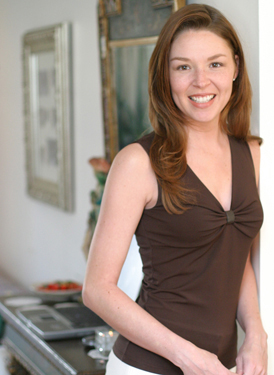Teen Spirit, in Two Cultures
Diana Rodriguez Wallach (COM’00) finds a niche — and an ethnic identity — in young-adult novels

Diana Rodriguez Wallach had never dreamed of being a novelist — until one night in 2004. After working first as a reporter in Manhattan, then as a public relations specialist for an educational nonprofit in Philadelphia, Wallach (COM’00) woke up one morning and remembered dreaming that she was the author of a series of young adult novels based on her middle school days. Unable to get the idea out ofher head, she sat down and started writing.
Although her first book didn’t sell, it wasn’t long before she tried another, this time successfully: Amor and Summer Secretshit bookstores in September. True to her dream, it’s the first in athree-part Latina-themed series being put out by Kensington Publishing.The second book, Amigas and School Scandals, came out in November, and the third, Adios to All the Drama, will appear in January. BU Todayspoke with Wallach about writing, ethnic identity, and what it feelslike to celebrate a book deal in New Orleans during Mardi Gras.
BU Today: Tell us about Amor and Summer Secrets.
Wallach:My protagonist, Mariana, is half Polish and half Puerto Rican, and she doesn’t feel strongly connected to either of her parents’ cultures. It isn’t until she’s forced to spend the summer in Puerto Rico that sheembraces her Latina roots.
Her experience is similar to my own. For much of mylife, I had a hard time connecting to my Puerto Rican roots because Idon’t fit the physical stereotype. I have auburn hair and freckles, andI didn’t learn Spanish in my home. But as I grew older, I chose to seekout those connections. I wanted to give Mariana a similar experience.
Coming from a mixed ethnic background, did you have trouble when youwere growing up relating to characters in books for teenagers? Do youfeel your books are filling a void?
Truthfully, I didn’t grow up feeling culturally Puerto Rican any morethan I grew up feeling culturally Polish, which is why it became one ofthe central themes of my novel. So I can’t say that I had any trouble relating to the novels available to me when I was younger. But I amhappy to see an increase in young adult novels featuring multicultural characters. I think it represents the reality of American society. Ithink a lot of people, and a lot of teens, can relate to being tornbetween two very different ethnic groups.
How did you feel when you first heard your book was going to be published?
This is one of my favorite stories. I got the call on a Tuesday. Well, it just happened to be Fat Tuesday, the day before Ash Wednesday, andI just happened to be in New Orleans.
Let me just say that there is no better place on Earth to be when you get good newsthan New Orleans at Mardi Gras. There was a parade going on outside of my hotel. I hung up the phone and spent the rest of the day dancing inthe French Quarter with hundreds of costumed strangers and drinking hurricanes at Pat O’Brien’s.
Didyour Boston University experience play a role in your becoming awriter? How has your journalism training influenced you as a writer offiction?
My journalism training has greatly affected my writing style. The young adult genre is known for “cutting out the fluff,” so to speak. We’re trying to maintain the attention of teenagers, so you won’t find a lot of long-winded prose. In a way, this is similar to journalistic writing.
Also, there’s a lot more to this profession than the art form. Right now, I’m working on promoting Amor and Summer Secretsfull-time, and those years I spent in public relations are greatly assisting me. From writing press releases to contacting bookstores todoing interviews, everything I learned at COM has come in handy. I evencreated a book trailer using the editing skills I learned as abroadcast journalism major. Truthfully, I couldn’t imagine approaching this career without a background in communications.
What are you working on now?
I’m working on a new young adult project. It’s a complete departure from what I’ve done in the past — lots of spies, suspense, fightscenes, and of course, a love triangle. Part of my research included reaching out to the BU community. Professor Nick Mills, a COM associate professor of journalism, put me in touch with former BU Professor Lawrence Martin-Bittman, who spent part of his life working as an intelligence officer in Czechoslovakia. His experiences very much contributed to the background research for my new novel. Hopefully, itwill be ready for the publishing world soon.
Any advice for aspiring authors?
Learn to take constructive criticism. When I first started out, I took feed back too personally. I couldn’t seem to separate myself from thework. But as I’ve grown through this process, I welcome editorial suggestions. It’s the only way to improve your writing.
Also,learn the fine art of patience. This business moves at the speed of a turtle. And trust me, after a few years even the most impatient people, like me, can learn to sit back and wait. The faster you learn this virtue, the saner you’ll be.
Visit Diana Rodriguez Wallach’s Web site to learn more.
This story originally ran in Bostonia online.
Comments & Discussion
Boston University moderates comments to facilitate an informed, substantive, civil conversation. Abusive, profane, self-promotional, misleading, incoherent or off-topic comments will be rejected. Moderators are staffed during regular business hours (EST) and can only accept comments written in English. Statistics or facts must include a citation or a link to the citation.